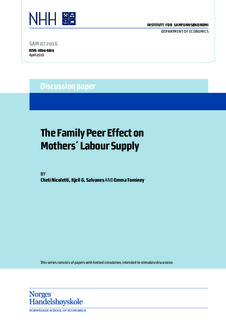| dc.contributor.author | Nicoletti, Cheti | |
| dc.contributor.author | Salvanes, Kjell G. | |
| dc.contributor.author | Tominey, Emma | |
| dc.date.accessioned | 2016-04-26T07:05:22Z | |
| dc.date.available | 2016-04-26T07:05:22Z | |
| dc.date.issued | 2016-04-26 | |
| dc.identifier.issn | 0804-6824 | |
| dc.identifier.uri | http://hdl.handle.net/11250/2387275 | |
| dc.description.abstract | The well documented rise in female labour force participation in the last century has
flattened in recent decades, but the proportion of mothers working full-time has been steadily increasing. In this paper we provide the first empirical evidence that the increase in mothers' working hours can be amplified through the effect on her labour decisions from the decisions of her family peers. Using Norwegian administrative data covering the full population of women, we study the long-run influence of the family network on mothers' labour decisions up to seven years post birth by regressing the mothers' working hours on the average working hours across her sisters and female cousins. To identify the causal peer effect, we exploit and extend the partially overlapping peer group approach by considering for each mother both her family and her neighbourhood networks, therefore assuming that a mother interacts
with her neighbours and family but she does not interact meaningfully with her family's
neighbours. Moreover, we provide some empirical evidence on the potential mechanisms such as the importance of information transmission versus imitation in explaining the peer effect. | nb_NO |
| dc.language.iso | eng | nb_NO |
| dc.relation.ispartofseries | SAM;7/2016 | |
| dc.subject | Peer e¤ects, Family network, Sibling spillover effects, Cousins spillover effects, Instrumental variable estimation | nb_NO |
| dc.title | The Family Peer Effect on Mothers´ Labour Supply | nb_NO |
| dc.type | Working paper | nb_NO |
| dc.subject.nsi | VDP::Social science: 200::Economics: 210 | nb_NO |
| dc.source.pagenumber | 52 | nb_NO |
